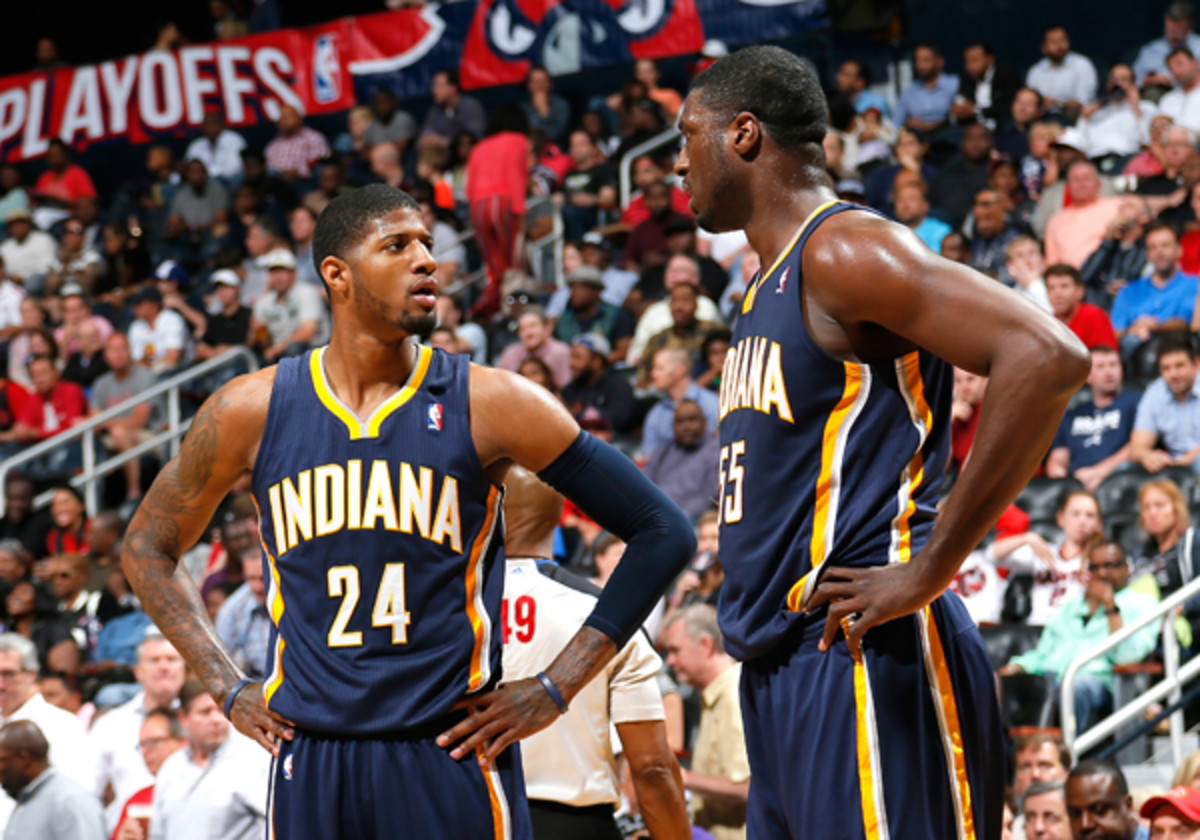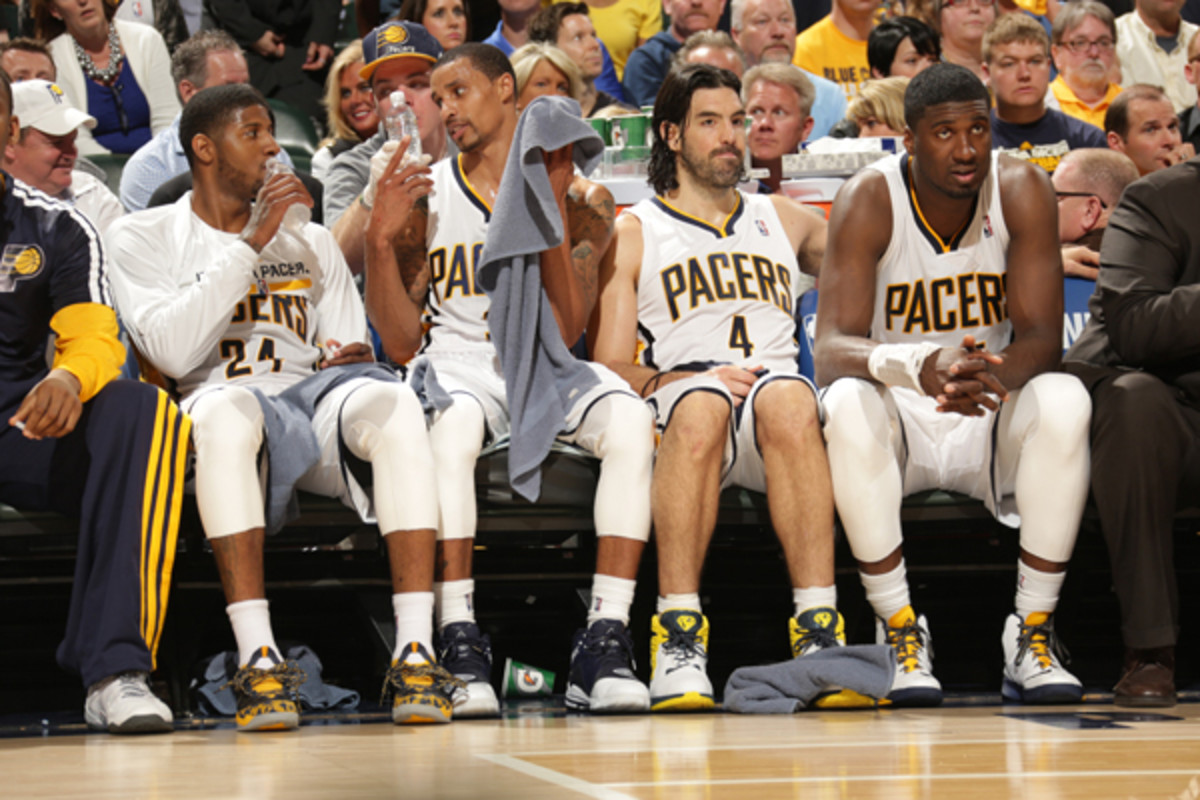Confidence Game: Roy Hibbert and the Pacers are Losing it Big-time

Hiss, rasp, croak. That’s the sound of the Pacers sucking in one last gasp of hope as they stand on the brink of an embarrassing first-round elimination in the NBA playoffs. What ever happened to the shot-blocking, dunk-slamming team that rocketed earlier this season to the No. 1 seed in the East? For many, the answer to that question starts and ends with All-Star center Roy Hibbert, whose 0.85 player efficiency rating so far this post-season is one of the worst ever recorded in the annals of the NBA.
For the 27-year-old Hibbert, it’s been a slow slide from two-time All-Star to all-time terrible. Just last season, the 7-foot-2 center averaged more than 22 points and 10 rebounds per game against the Heat in the Eastern Conference Finals. The first half of this season, he was considered a frontrunner for Defensive Player of the Year. But something happened after the All-Star break, and since then, Hibbert’s performance has skidded. On the court, the 2008 Georgetown grad has looked more like an awkward teenager at his own prom, too big and clumsy to dance with the ball or anyone else, than a fluid powerhouse capable of shutting down LeBron James. Hibbert’s recent humiliation reached a zenith in Game Five against the Hawks, when Hibbert failed to register a single rebound or point during his 12 minutes of play—although he did manage to foul four times and get benched for the second half of the game. Hibbert’s not injured, so what on earth is wrong with him?
“I think he’s lost all confidence in himself,” says Dr. Rob Bell, an Indianapolis-based sports psychologist and Pacers fan who doesn’t work with Hibbert or the Pacers. “But more importantly, the team has lost confidence in him. And once that happens, it’s just a downward spiral.”

According to Bell, it’s bit of an Andromeda Strain situation: A lack of confidence develops, and then it infects the entire team. Yet in Bell’s opinion, it was the Pacers who brought the nasty virus of insecurity to Hibbert, not the other way around. “I think his teammates lost confidence in him first, and then it started to wear off on one another,” says Bell, the author of two books on mental toughness. “And now, Hibbert knows it.”
As proof of Hibbert’s lack of confidence, Bell says that all you have to do is watch the center’s body language for a few uncomfortable minutes. “What I always say is that body language doesn’t talk, it screams. And in the case of Roy Hibbert, it swears. He’s the biggest man on the floor, but he’s playing as small as possible. He’s seven-foot-two, but not even playing like he’s six-foot-two,” Bell says.
But why would a team lose confidence in a center who just last season repeatedly blocked LeBron to help the Pacers take the Heat all the way to a Game 7? Daniel McCaffrey, the CEO of SyncStrength, a software company that analyzes pro player performance and team chemistry, says that it’s difficult to know when or where Hibbert’s problems started, if they, in fact, even started with the team. “There can be a range of causes for a player’s lack of confidence, and it’s difficult to tell without knowing what’s going on in the locker room,” says McCaffrey, who doesn’t work with Hibbert or Indiana. “Problems like this don’t happen overnight, especially when it’s bad as it is with Pacers now.”
What also didn’t happen overnight, though, are Hibbert’s apparent struggles with self-confidence. In 2011, the center revealed that he was seeing a sports psychologist due to “mental” issues. “Breakdowns in confidence typically surface over an extended period of time, with coaches and the front office aware of the cause,” says McCaffrey. “Coaching staffs need to step in with a plan and a course of action to get that player back on track.”
Whether anyone in Pacers management has stepped in with Hibbert is a big unknown—Indiana’s front office won’t comment on its center or on any team dynamics stemming from Hibbert’s poor play. But it doesn’t take a press release to see that the center’s poor performance of late has helped set in motion what may be one of the biggest disappointments in this year’s playoffs. “The downturn in Roy Hibbert’s play has clearly affected the chemistry of the team,” McCaffrey says. “This can be seen by the lack of effort off the ball and the body language between teammates—it looks as though they don’t want to play with one another.”

For fans like sports psychologist Bell, it’s evident that the Pacers don’t want anything to do with Hibbert. “I remember watching one of the last games of the regular season, when there were less than two minutes to play,” Bell says. “The Pacers had three trips down the court, and they didn’t go to [Hibbert] at all. That’s a big, red flag. Something’s really awry when you don’t go to your All-Star center with less than two minutes and you’re down by a bucket.”
The Pacers, though, may well have their reasons for not feeling like feeding the ball to Hibbert—it’s not as though the center has been all roses and trinkets toward his teammates in recent months, even calling them “selfish dudes” in March after Indiana’s loss to the Washington Wizards. Sports psychologist Charlie Maher, who has worked with the Cavaliers and Spurs, says that kind of trash talking is an indication that Hibbert may have reached a frustration tipping point. “He’s thinking and trying to deal with things that he can’t control,” speculates Maher, who doesn’t work with Hibbert or Indiana. “He’s not cool, calm, and collected, so if someone in the media asks him a question, he’ll say something.”
NBA Star Trainer Tim Grover On What It Takes To Win
Shot Class: Klay Thompson's ABCs of Swish
Finish Strong: NBA Trainers' Push Late-season Fitness
Retired All-Star forward Anthony Mason, who played in the finals for the Knicks, Hornets, Heat, and Bucks, says that speaking out like Hibbert has only brings scrutiny on a player and his team—scrutiny that’s incredibly difficult to shake off in the playoffs. “Once the attention is on you and you don’t perform, the basket gets smaller, the crowd gets louder, a lot of stuff starts working against you,” says Mason. “In [Hibbert’s] case, if they’re going to use him at all, they have to give him the ball. You have to get him involved all the way across the board.”
Regardless of this year’s playoffs, Bell says Indiana will have to do a lot of work on its team chemistry in the off-season if they want to regain dominance next year. “The Pacers-and-Hibbert situation is one of the worst I have ever seen,” Bell says. “I try always to paint the solution, but the team and Hibbert have lost so much confidence and identity this season that I don't know if they can rebound.”
